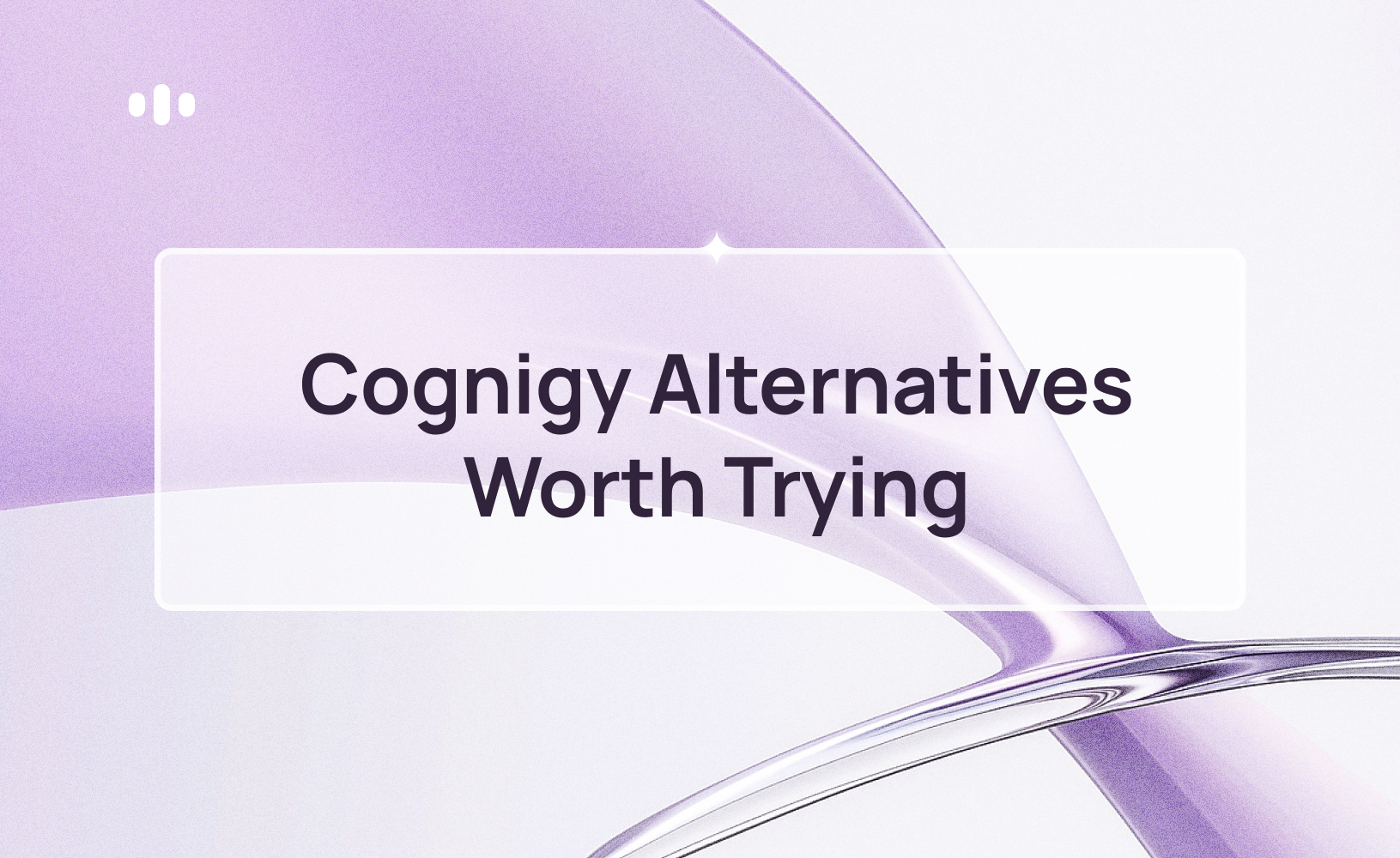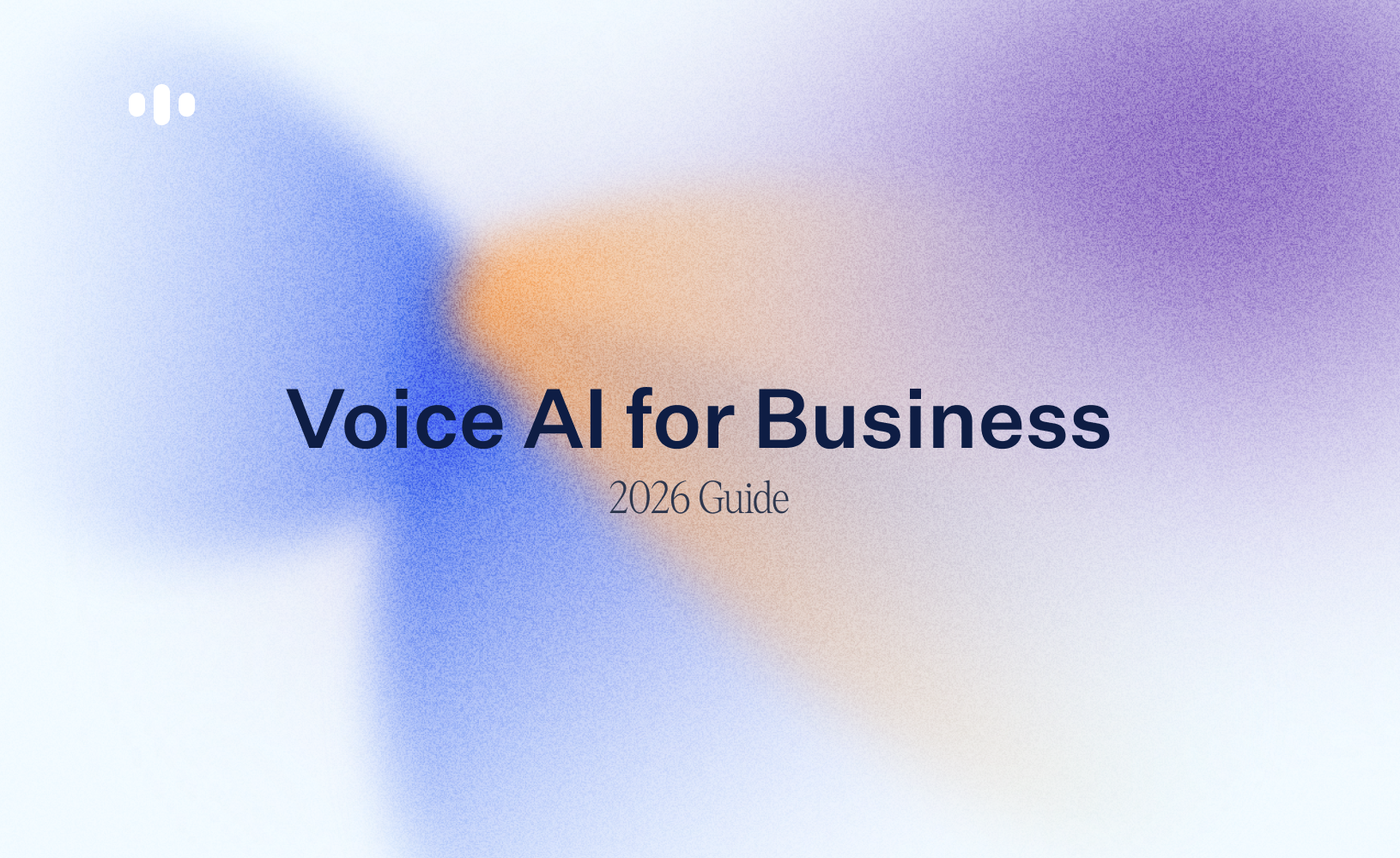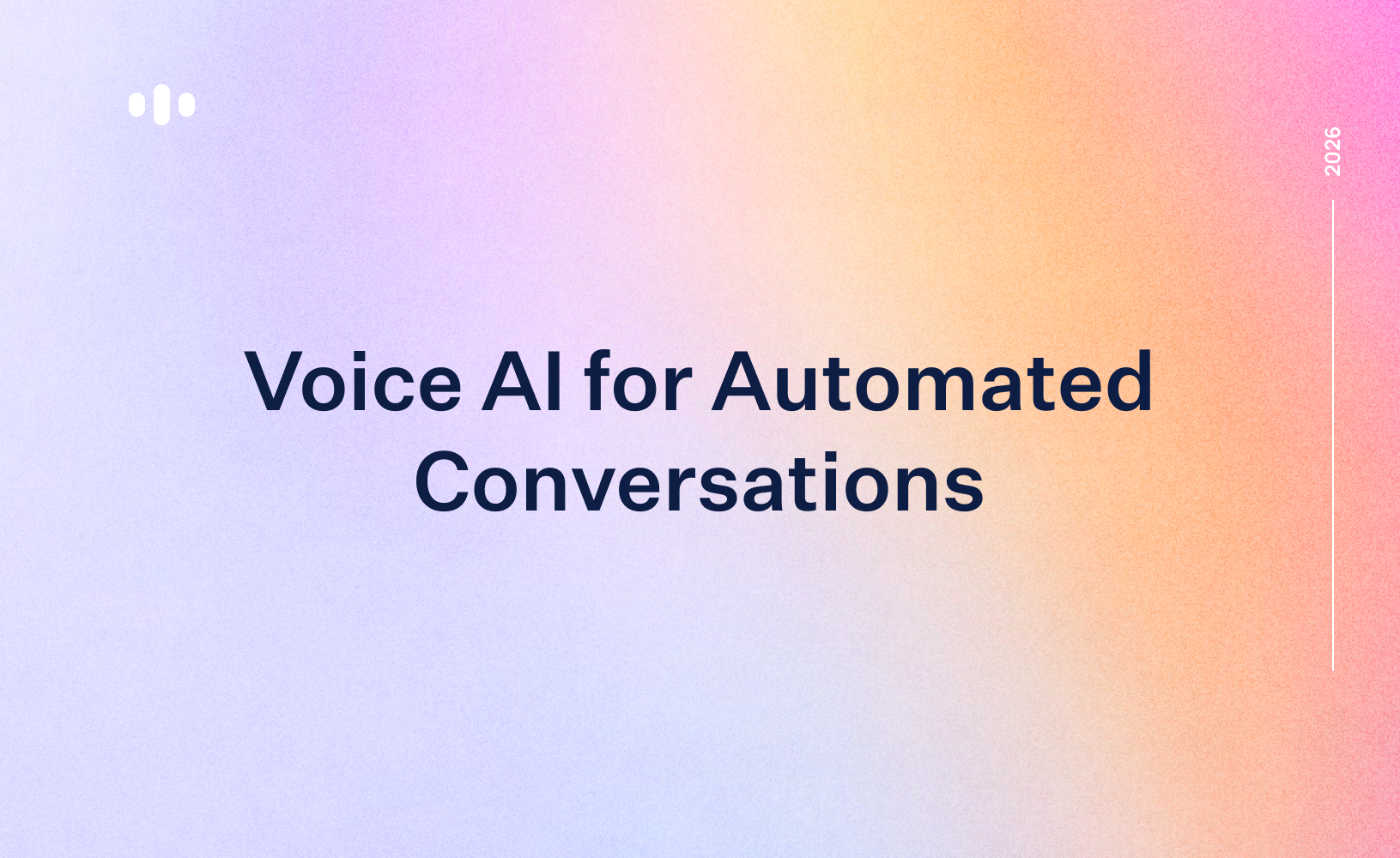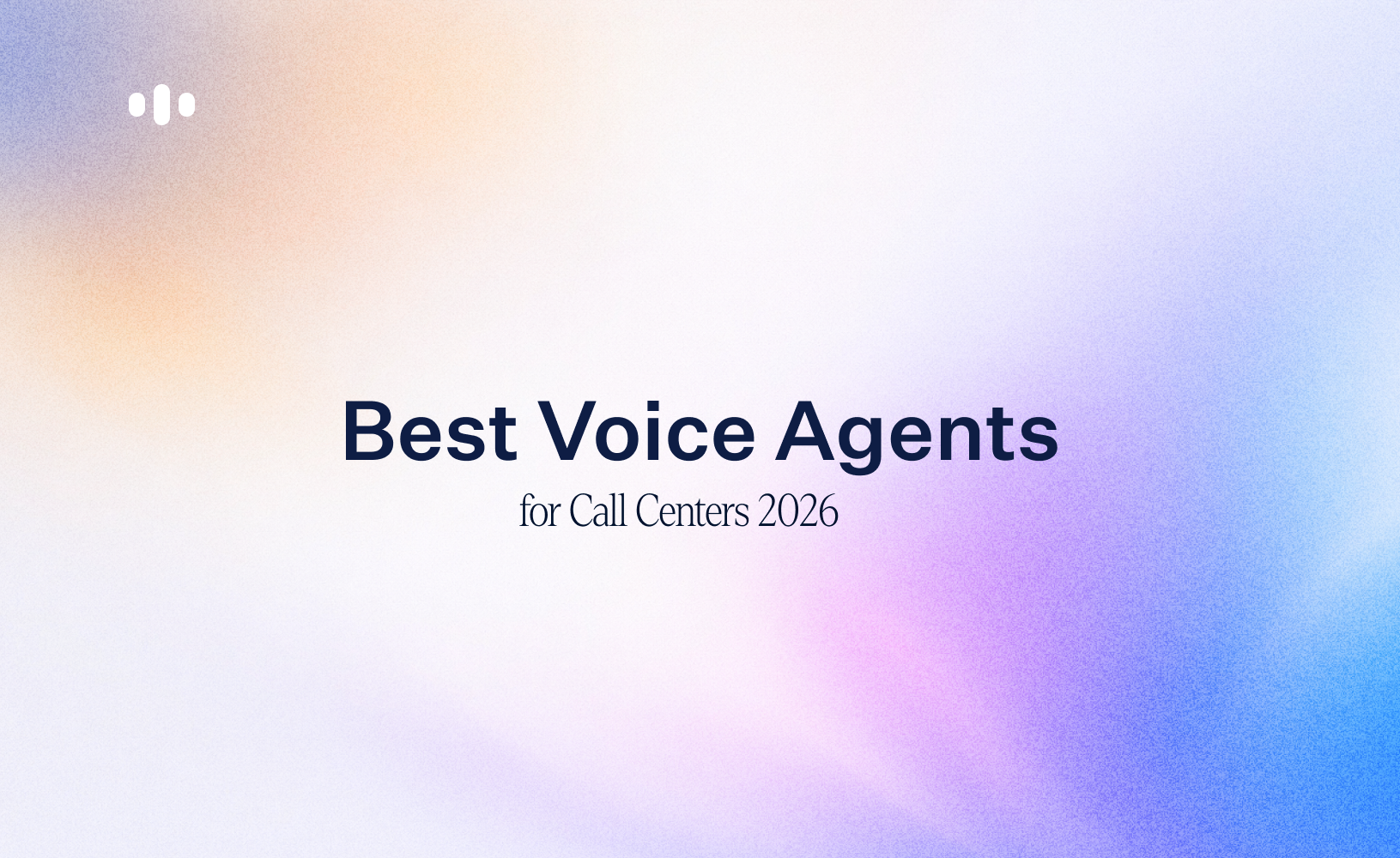If you’re exploring the best alternatives to Cognigy, you’re likely searching for conversational AI platforms that move faster, scale smoothly, and keep costs transparent.
Cognigy has built a strong reputation for enterprise-grade automation, but many teams find the rollout process slower than expected and the pricing less predictable.
In this guide, I’ll walk through eight leading platforms, from enterprise suites like Kore.ai and PolyAI to faster-moving challengers like Synthflow, Voiceflow, and Retell AI, to help you find the right balance between flexibility, usability, and speed.
TL;DR: Cognigy remains a solid enterprise solution, but tools like Retell AI, with its low-latency voice engine, no-code builder, and transparent pricing, make a strong case for teams that want to move fast without giving up quality.
What is Cognigy?
Cognigy is an enterprise-grade conversational AI platform positioned among leading ai platforms, designed to help organizations build and scale intelligent voice and chat agents.
With a low-code visual builder, support for multiple speech-to-text engines, and robust natural language understanding (NLU) capabilities, as well as the ability to orchestrate complex backend systems, it’s often used in large contact centers and regulated industries that need strict compliance.
Cognigy focuses on giving enterprises a flexible framework to design and manage advanced automation across voice, chat, and digital channels.
For companies with significant internal resources, it can serve as a powerful “control center” for conversational AI. But that same flexibility often comes with tradeoffs in speed, usability, and cost.
What to Look for in Customer Interactions When Evaluating Cognigy Alternatives
When you’re considering Cognigy or any competing platform, the right question isn’t just “can it build chatbots?”, it’s “can it actually support my business goals at scale?”. When evaluating platforms, pay close attention to their key features and how well they align with your business needs.
Choosing a conversational AI solution is a long-term decision, and there are a few fundamentals worth keeping in mind:
- Ease of Use vs. Depth of Features: Some companies prioritize intuitive, no-code builders that empower non-technical teams, while others need developer flexibility and advanced orchestration. The right balance depends on who will actually own and maintain the system day to day, and how well the platform adapts to your business needs.
- Quality of Voice and Conversation: In voice automation, naturalness is everything. Look for platforms that offer low latency, realistic speech synthesis, and strong handling of interruptions or unclear requests
- Scalability and Reliability: If your business runs on high call volumes or global operations, uptime and performance under load become critical, especially when operating an AI answering service that must manage hundreds of concurrent calls smoothly. Evaluate how well a platform scales across thousands of concurrent interactions without dropping quality.
- Integration Ecosystem: A voice or chat agent is only as useful as the systems it connects to. CRM, scheduling, ticketing, payments, your chosen platform should offer seamless integration with your existing stack to ensure smooth workflows and maximize efficiency.
- Flexibility With AI Models: The generative AI landscape is moving fast. Look for platforms that can incorporate new LLMs or hybrid approaches without requiring a rebuild, providing maximum flexibility so you’re not locked into today’s limitations.
- Transparency and Cost Predictability: Pricing models vary widely in this space. Some platforms focus on large enterprise contracts, while others allow smaller pilots that scale as you grow. Clear, predictable costs make it easier to get buy-in from stakeholders.
By framing your evaluation around these broader dimensions, you’ll be better equipped to compare alternatives side by side.
Why Teams Look Beyond Cognigy
Even though Cognigy has a strong reputation, reviews often highlight recurring challenges.
- Slow Implementation Cycles: Deploying Cognigy in production, from backend integrations to testing and QA, can take several months, delaying ROI and frustrating teams that need faster results and lack faster time to value.
- Opaque and Complex Pricing: Costs are typically handled through custom enterprise contracts, making it difficult to forecast expenses or understand how usage will scale over time.
- Limited Accessibility for Non-Technical Teams: Although Cognigy markets itself as low-code, many users report needing developer support for advanced logic, integrations, or even small conversational updates.
- High Setup Overhead: The platform’s “blank canvas” flexibility often means teams must build everything from scratch, increasing time-to-launch compared to tools with prebuilt templates or automation modules.
- Scaling and Maintenance Challenges: As deployments grow and high volumes of customer interactions are handled, teams face ongoing work managing model drift, monitoring performance, and maintaining infrastructure.
- Compliance and Security Limitations: For industries like finance and healthcare, certain security and compliance requirements are non negotiable, and Cognigy may not always meet these strict standards.
- Limited Visibility for Business Stakeholders: Non-technical users often struggle to track performance or make adjustments independently, leading to slower iteration cycles.
In short, Cognigy is powerful but not always the right fit. For many organizations, the sweet spot is a platform that delivers faster launches, easier ownership, and more transparent costs.
Cognigy Alternatives and Conversational AI Platforms Competitors
1. Retell AI
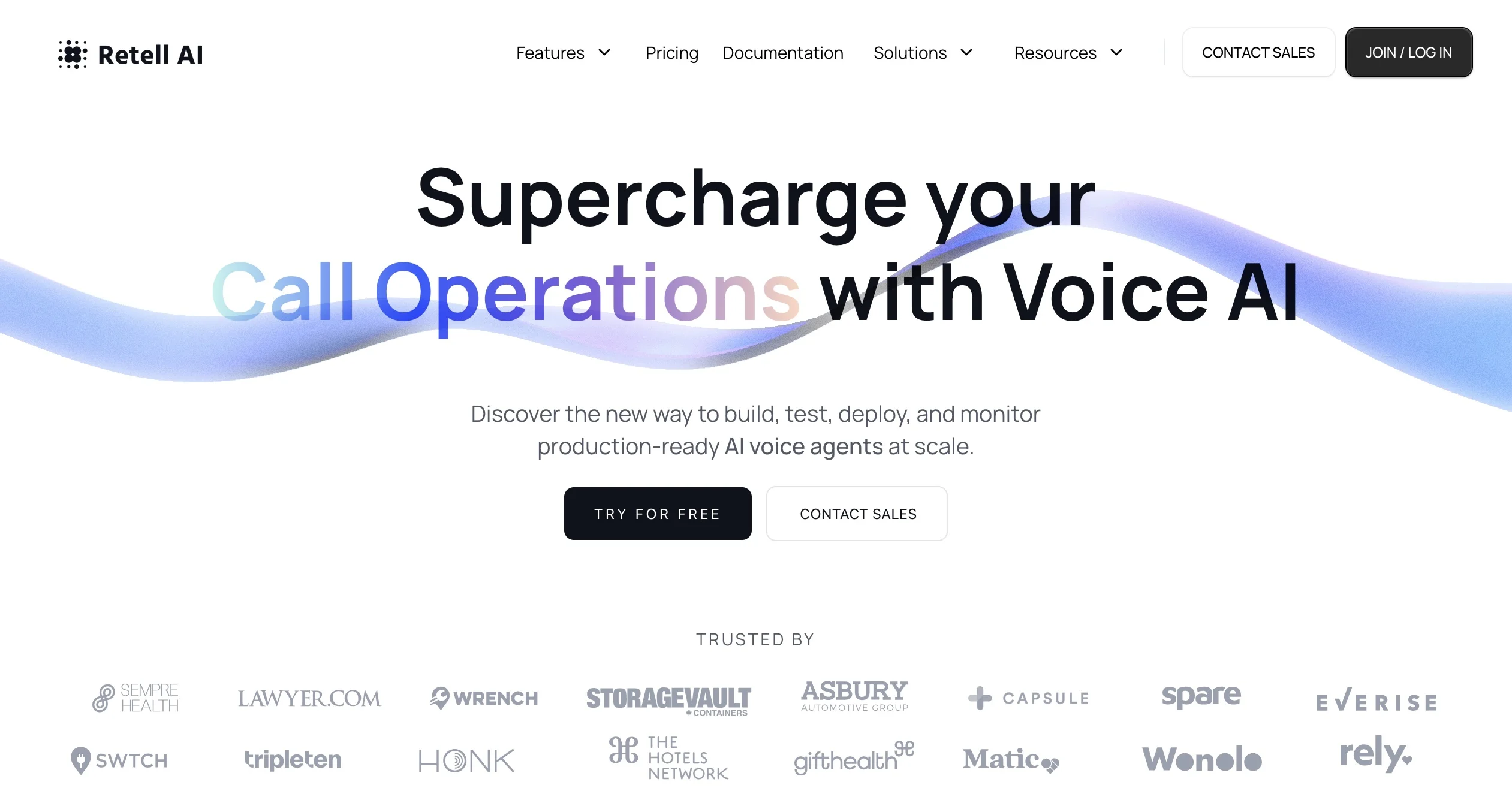
Retell AI focuses on natural, low-latency voice interactions that feel indistinguishable from speaking with a live agent.
Unlike other platforms that may require third-party processing and external data handling, Retell can be deployed on-premise or within private infrastructure, giving organizations more control over their data and reducing security risks.
The platform is designed for quick deployment, with a no-code builder that allows non-technical teams to launch pilots in weeks rather than months. Retell integrates easily with CRMs, scheduling systems, and telephony providers, making it accessible to both mid-sized companies and larger enterprises. These features help businesses customize and optimize customer support, ensuring interactions are tailored to each stage of the customer experience.
Advantages Compared to Cognigy
- Voice-First Architecture: Retell is purpose-built for real-time AI voice conversations with sub-second latency and natural turn-taking, making it ideal for building advanced voice assistants that handle complex customer service interactions.
- Ultra-Low Latency Conversations: Retell averages around 800 ms response times, allowing seamless back-and-forth dialogue that sounds human.
- Flexible No-Code + API Workflow: Retell combines an intuitive visual builder with a powerful API, enabling teams to launch fast and still customize deeply.
- Real-Time Call Handling: Retell supports inbound and outbound AI phone agents that can schedule, qualify leads, and follow up automatically, leveraging voice assistants for automation.
- Built-In Transcription and Analytics: Every call in Retell is automatically transcribed, summarized, and analyzed for intent, duration, and performance metrics.
- Enterprise-Grade Security and Compliance: Retell includes SOC 2 (Type I & II), HIPAA, and GDPR compliance out-of-the-box, plus automatic PII redaction.
- Transparent Pay-As-You-Go Pricing: Retell offers usage-based pricing starting at a few cents per minute with no long-term contracts or platform fees.
- Easy Integration with Existing Tools: Retell connects natively to CRMs like Salesforce and HubSpot, as well as SIP trunking and telephony APIs, ensuring a simplified technical setup with direct integration options such as SIP, Twilio, or BYOC.
- Faster Implementation and Lower Maintenance: Retell’s lightweight architecture allows teams to go live in hours, not weeks, with minimal infrastructure overhead. Cognigy’s enterprise complexity often leads to longer implementation cycles and higher operational costs.
Pricing
Transparent, usage-based pricing (starting at $0.07/minute for voice and $0.002/message for chat). For high-volume enterprise use, discounts apply (voice rates can drop to ~$0.05/minute). Total costs scale predictably with usage, and there are no hidden platform fees.
G2 Rating: 4.8/5 (612 reviews)
Review: "Retell AI has completely transformed the way we manage automated calls, with impressive voice quality and understanding".
Best for:
Businesses of all sizes that want fast deployment, human-like voice agents, and straightforward pricing without enterprise lock-in.
Build your first Retell agent in minutes for free.
2. Synthflow
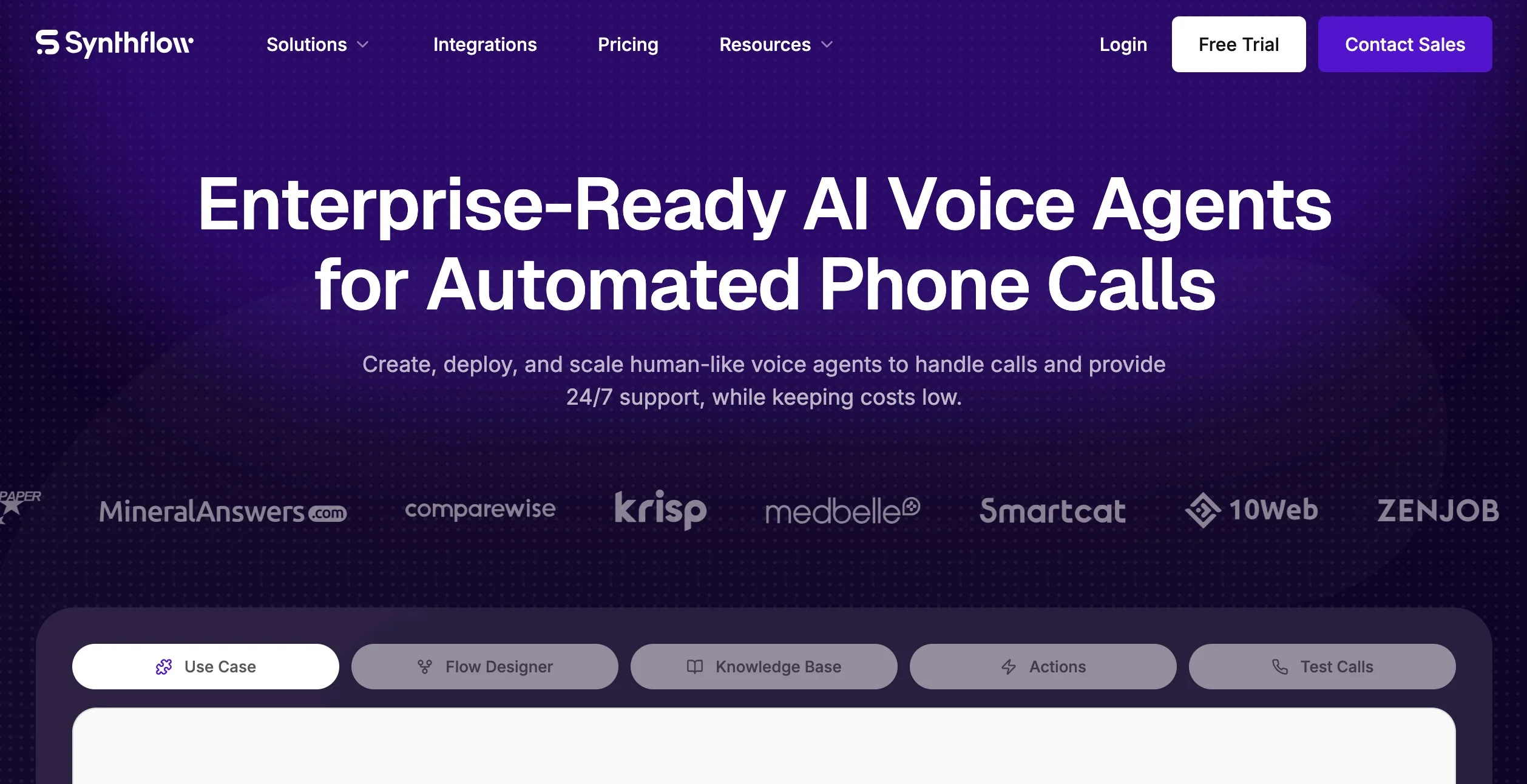
Synthflow is a no-code platform designed to let businesses quickly build AI-powered voice agents.
It focuses on speed of deployment, user-friendly flow design, and support for multiple languages. With voice cloning and tone customization features, it appeals to companies experimenting with personalized automation.
Advantages Compared to Cognigy
- Usage-Based Pricing: Synthflow publishes its rate of $0.08 per minute as part of its pricing structure, making it easier to forecast costs compared to Cognigy’s opaque enterprise licensing.
- No-Code + Drag-and-Drop Agent Builder: Synthflow offers a visual, no-code interface to build and deploy voice agents without writing code, making it more accessible for non-technical teams. As a low code platform, it also allows rapid customization and deployment with minimal coding, supporting scalability and easy integration with messaging or voice channels.
- Low Latency Voice Interactions: Synthflow claims to support response latencies under 500 ms (or very low latency) for voice calls, enhancing conversational naturalness.
- Expressive Voice Options & Voice Cloning: Synthflow integrates with ElevenLabs to provide expressive, natural-sounding voices and supports voice cloning, giving more human-like tone control while maintaining brand consistency across all customer interactions.
- Multilingual Support & Accent Flexibility: Synthflow supports multiple languages and accents, enabling deployment in international contexts.
- Robust Integrations with CRMs & Tools: Synthflow provides native integrations (or connectors) with CRMs, calendars, and other operational tools such as HubSpot, Zoho, and mork.
- Structured Workflows & Business Logic: Synthflow enables the implementation of structured workflows and business logic, ensuring compliance, reliability, and adherence to predefined processes for more controlled and error-free interactions.
Pricing
Synthflow offers transparent and tiered pricing: plans start at $29/month (which includes 50 minutes) and scale up (e.g. $450/month, $900/month, $1,400/month). Beyond those tiers, usage is billed per minute (e.g. ~$0.12–$0.13/min) and per concurrent call.
At enterprise scale, custom contracts apply and pricing can drop to $0.08/minute based on volume.
G2 Rating: 4.5/5 (815 reviews)
Review: "What I like best about Synthflow is that it doesn’t bury you in technical complexity. You don’t need to be a coder or spend weeks wiring together APIs just to get a usable AI voice agent".
Best for:
Startups and mid-sized businesses looking for an affordable, no-code solution to test and launch voice automation quickly.
3. Kore.ai

Kore.ai is an established conversational AI provider with strong enterprise adoption.
It offers a broad platform that spans voice, chat, and digital interactions, with a robust workflow builder and AI-powered orchestration. Its ecosystem includes integrations with popular CRMs, ticketing tools, and telephony systems, making it a versatile choice for large organizations.
Advantages Compared to Cognigy
- Capable Platform for Enterprise Needs: Kore.ai stands out as a capable platform, going beyond basic conversational AI by embedding workflow automation, backend triggers, and task orchestration directly into its virtual assistants.
- Model-Agnostic and LLM-Flexible Architecture: Kore.ai supports multiple large language models and lets teams orchestrate across them, giving enterprises more freedom and avoiding vendor lock-in.
- Extensive Enterprise Integrations: With over 100 pre-built connectors for CRMs, ERPs, HR, and IT systems, Kore.ai enables faster and deeper automation.
- Omnichannel Orchestration: Kore.ai maintains full context across voice, chat, messaging, and mobile apps, enabling seamless handoffs and smart AI IVR routing that improves call containment and customer satisfaction.
- Enterprise-Grade Governance and Compliance: Kore.ai provides robust access controls, audit trails, and data-governance features designed for highly regulated industries like finance and healthcare, with deployment options including private cloud for enhanced security and compliance.
Pricing
Kore.ai does not publicly list pricing for most enterprise deployments. Many reported enterprise projects begin around USD 300K per year, and Kore.ai typically negotiates custom contracts based on modules, usage, and scale.
G2 Rating: 4.7/5 (413 reviews)
Review: "I really appreciate Kore.ai’s low-code/no-code environment, which makes designing complex flows simple and efficient".
Best for:
Enterprises that need an end-to-end platform with extensive integrations and have internal resources to manage complexity.
4. Bland
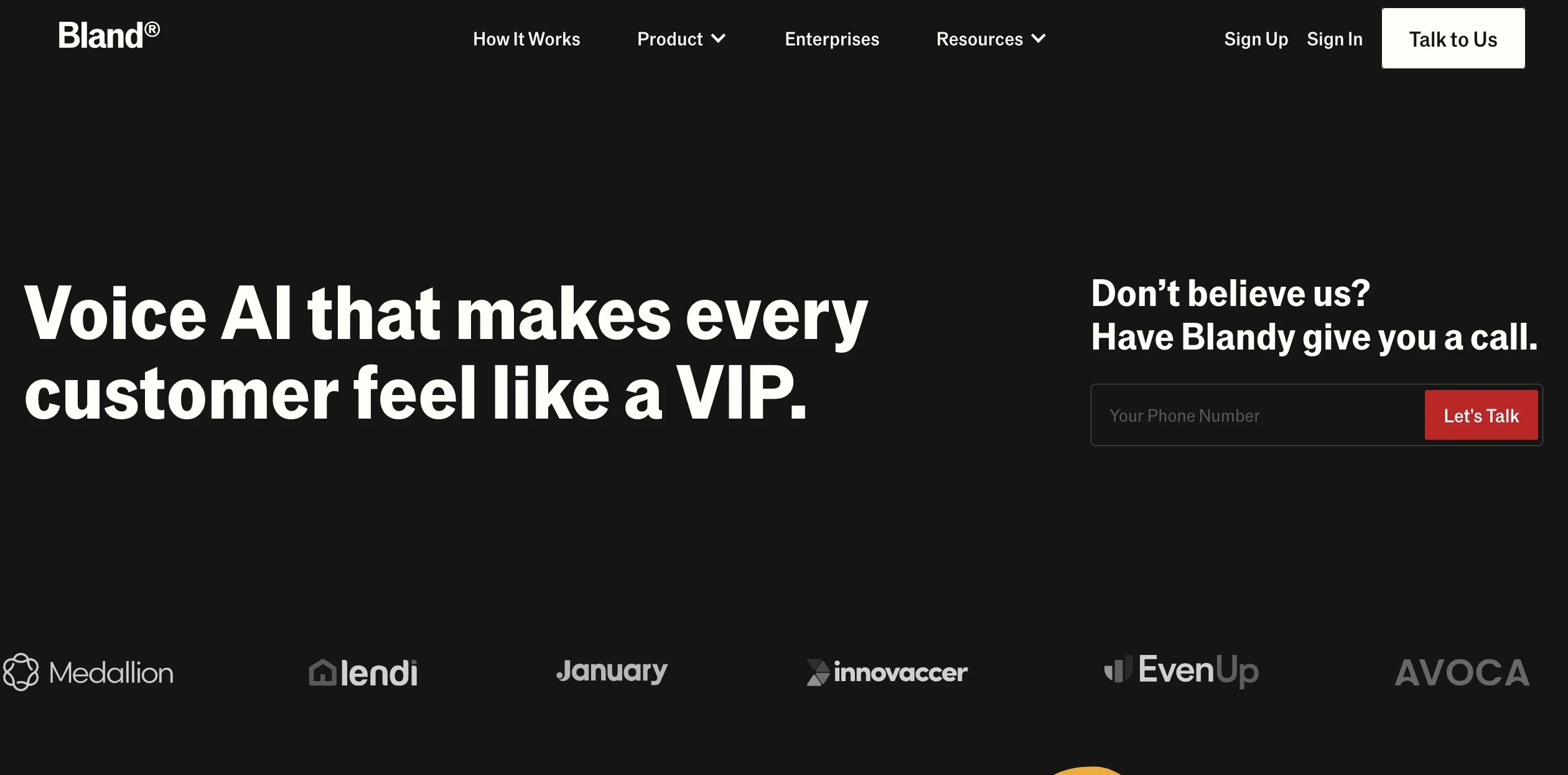
Bland emphasizes hyper-realistic voice experiences with strong security and data governance. It supports high-volume inbound and outbound calling, SMS, and omnichannel workflows. Bland markets itself as capable of scaling up to one million concurrent calls, making it attractive to enterprises that demand resiliency.
Advantages Compared to Cognigy
- Optimized for Outbound & Voice-First Use Cases: Bland AI is heavily focused on outbound voice automation (sales, scheduling, lead outreach), making it highly suitable for enterprise contact centers that require scalable solutions for handling large volumes of phone calls, whereas Cognigy is more generalist and multichannel.
- Self-Hosted Low-Latency Infrastructure: Bland emphasizes its self-hosted architecture optimized for ultra-low latency and high reliability, aiming at consistent, real-time voice performance.
- Customizable Conversational Paths: Bland allows detailed control over dialogue flows, conversation guardrails, and brand alignment in voice conversations.
- Real-Time Analytics & Monitoring: Bland provides real-time call monitoring, dashboards, and analytics (including sentiment analysis) to observe performance, call outcomes, and agent behavior.
- Focus on Sales / Lead Qualification Use Cases: Bland’s specialization in sales and lead workflows means features tailored for qualification, appointment setter, and outbound sequences are prioritized.
Pricing
No public pricing. Bland generally positions itself at the enterprise tier, with costs reflecting its scale and customization focus.
Product Hunt Rating: 3/5 (10 reviews)
Best for:
Large enterprises with strict requirements for privacy, governance, and brand voice customization at scale.
5. Yellow.ai
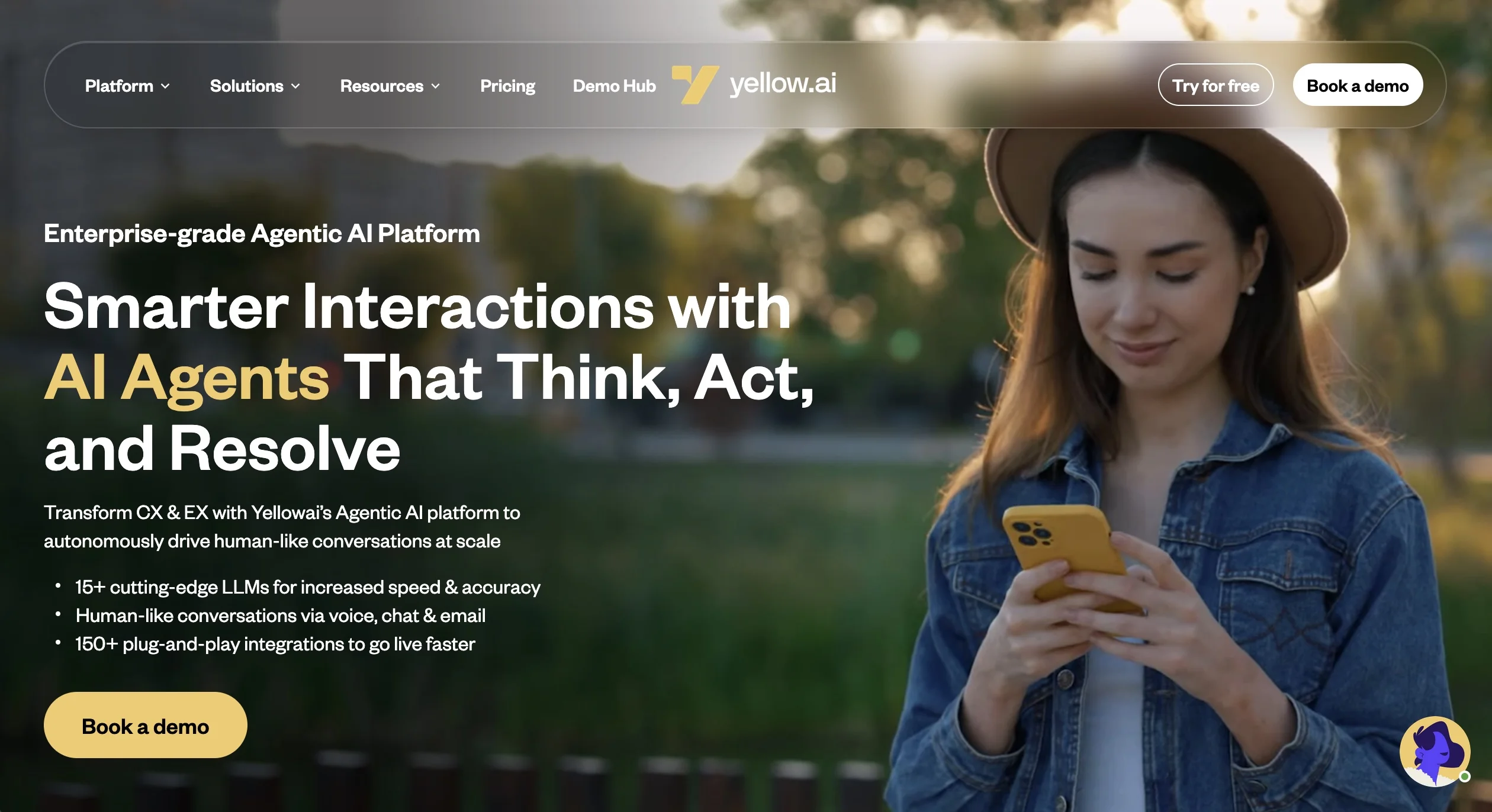
Yellow.ai markets itself as an AI-first platform for omnichannel engagement, covering voice, chat, messaging apps, and web interactions.
It highlights multilingual capabilities and automation for both customer service and employee workflows, with a strong presence in global markets.
Advantages Compared to Cognigy
- Customer Service Automation Focus: Yellow.ai is designed to enhance and scale customer service automation, improving customer interactions and streamlining workflows for enterprises.
- Multichannel & Voice Agent Support: Yellow.ai supports voice bots integrated with phone systems, enabling seamless voice conversations in addition to chat and messaging channels, including Facebook Messenger.
- No-Code / Low-Code Bot Building: Yellow.ai offers a no-code chatbot/agent studio for rapid bot creation and deployment, reducing dependency on developers.
- Extensive Integrations & Plug-and-Play Connectors: Yellow.ai provides 150+ integrations (CRMs, telephony, ERPs, knowledge bases) out of the box.
- Advanced Analytics & Real-Time Insights: The platform offers dashboards with metrics like deflection rates, goal completion, user journey visualization, and shareable reports.
- Multilingual Capabilities: Yellow.ai places a strong emphasis on language diversity, supporting multilingual conversational AI to efficiently deploy solutions across multiple regions.
- Cost Efficiency & Operational Savings: Yellow.ai claims it can reduce customer service operating costs by up to 60%.
Pricing
Custom and hybrid pricing: Yellow.ai blends subscription tiers with module-based usage fees (e.g. MRU, WhatsApp message volume). Entry-level enterprise deals often start around USD 10,000/year for a single-use-case bot, scaling upward significantly with added features, integrations, channels, ad usage demands.
G2 Rating: 4.4/5 (106 reviews)
Review: "The dashboard is great, user friendly. We can keep monitoring the trends on a real-time basis!".
Best for:
Global enterprises that want a single vendor to cover voice, chat, and messaging automation across multiple languages.
6. Sierra AI

Sierra AI deploys advanced AI agents for customer service that are uniquely trained to align with a company's specific brand identity.
These agents can reason, predict, and take action not just based on a knowledge base, but also by adhering to the company’s tone, values, and policies for a highly personalized interaction.
Advantages compared to Cognigy
- Action-Oriented AI Agents: Sierra agents can perform tasks like updating CRM records, managing orders, or executing business workflows, reducing manual handoffs.
- Multi-Model / Constellation LLM Architecture: Sierra uses a “constellation” of LLMs rather than relying on one model, enabling llm powered agents that boost reliability, flexibility, and reduce hallucinations.
- Agentic AI: Sierra’s autonomous agents leverage agentic AI to make real-time decisions, dynamically manage conversations, and collaborate with human agents for improved customer service efficiency.
- Branding, Tone & Custom Voice Control: You can tailor your agent’s tone, voice, persona, and brand alignment so the AI feels consistent with your brand identity.
- Transcripts, Analytics & Monitoring: Interactions with Sierra’s voice agents are automatically recorded, transcribed, tagged by topic/sentiment, and surfaced in dashboards for performance analysis.
- Security, Compliance & Auditability: Sierra emphasizes trust, compliance, and auditability, providing organizations with full control. Their system supports secure integration with enterprise systems and imposes controls so AI agent actions remain within boundaries.
G2 Rating: 4.3/5 (12 reviews)
Review: “User friendly, fast and many supported languages. Very complex setup process and more bugs then competitors”.
Pricing
Sierra’s pricing begins at approximately $150,000 annually, making it a more cost-effective alternative for sophisticated AI.
Final pricing is customized based on agent complexity and expected interaction volume. This structure provides a lower total cost of ownership compared to Kore.ai while delivering powerful, brand-aligned automation.
Recommended for:
Customer-centric brands where a consistent voice and adherence to company policy are critical, especially in telecommunications and financial services managing diverse customer segments.
7. PolyAI

PolyAI specializes in multilingual customer support and call deflection. Integrates with major CRMs and contact center systems, and provides advanced voice customization, deep analytics, and rapid deployment.
Advantages Compared to Cognigy
- ASR Tuned for Contact Centers: PolyAI fine-tunes automatic speech recognition on real call data to cut word-error rates and improve recognition in noisy environments.
- Natural, Human-Like Dialogues: Callers often don’t realize they’re speaking to an AI, thanks to interruption handling and lifelike turn-taking. PolyAI supports seamless, scalable customer interactions across channels.
- Per-Minute Enterprise Pricing: PolyAI prices ongoing use on a per-minute basis (including maintenance and 24/7 support), which can simplify modeling total cost of ownership versus license-heavy stacks.
- Enterprise-Grade References & Scale: PolyAI handles consistently high call volumes for global brands, reinforcing readiness for large contact centers.
- Seamless Integration: PolyAI integrates with your existing contact center environment, whether on-premises, cloud-based, or hybrid, to enhance and extend current capabilities.
- Advanced Analytics: PolyAI provides analytics that help identify areas for improvement or automation, such as coaching needs or quality issues.
Pricing
Custom pricing with high entry thresholds (starting near $150K/year). Pricing is usage-based but not publicly disclosed.
G2 Rating: 5/5 (11 reviews)
Review: "There are many options for AI currently in the market. PolyAI impressed us by providing a product that could be launched in a short amount of time without risking quality".
Recommended for:
Large enterprises and contact centers needing fully managed, custom voice AI solutions with top-tier language capabilities.
8. Voiceflow
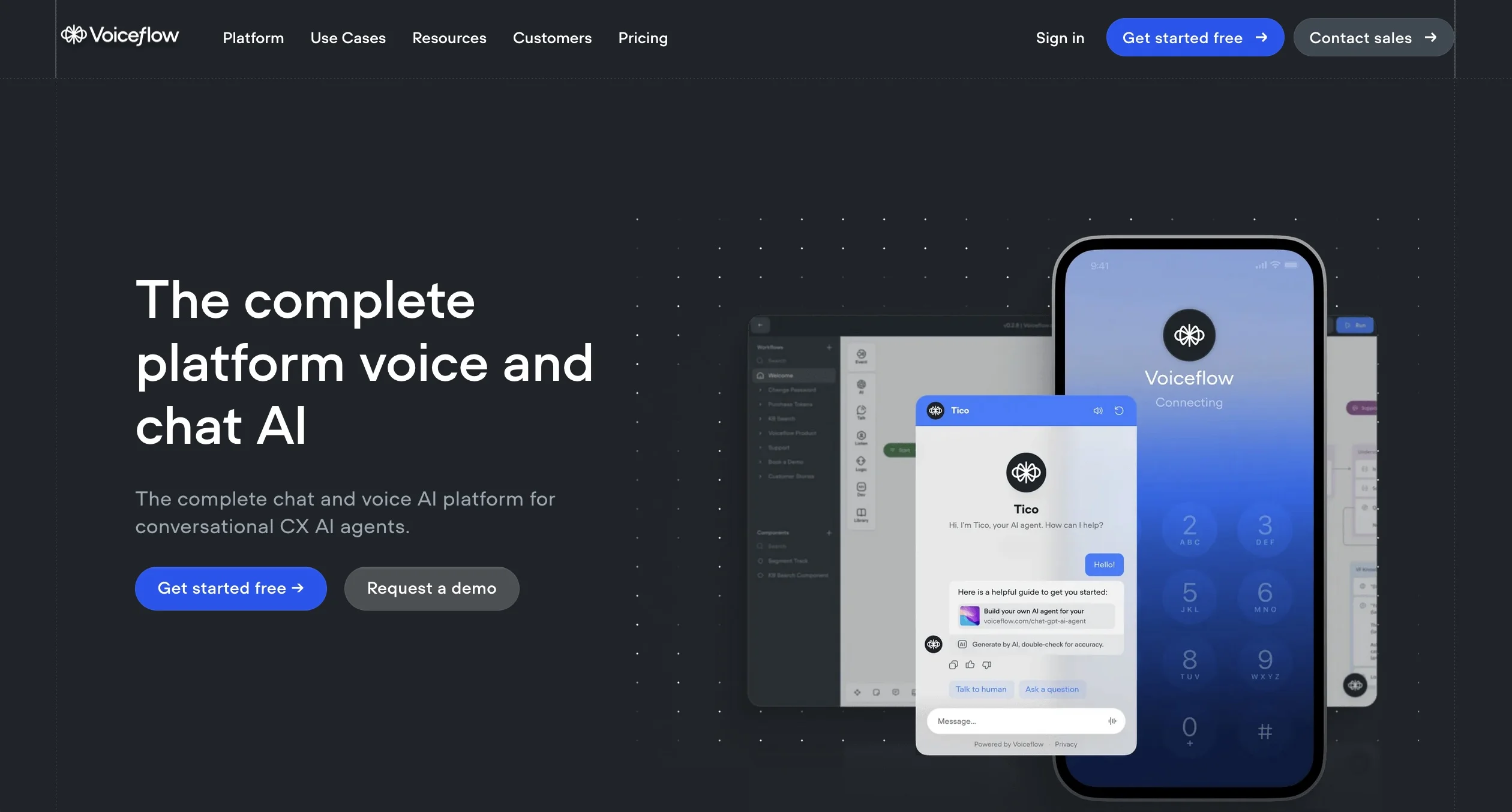
Voiceflow is a leading no-code platform for designing conversational workflows across both voice and chat.
It excels in prototyping and collaboration, allowing teams to co-design flows, manage knowledge bases, and test experiences before launch.
Advantages Compared to Cognigy
- AI Offers for Contact Centers: Voiceflow provides specialized AI offers that automate customer interactions through conversational AI, featuring multi-channel support, real-time automation, and integration with business systems to improve contact center operations.
- Rapid Prototyping & Instant Testing: Voiceflow lets teams preview and iterate conversations in seconds, so you can validate flows before engineering work begins, ensuring the conversational experience closely mimics human interaction.
- Intuitive No-Code Visual Builder: Build full conversational logic with a drag-and-drop canvas instead of JSON or scripts.
- Built-In Collaboration at Scale: Real-time teamwork across shared workspaces with commenting and permissions helps product, design, and ops co-design without developer bottlenecks.
- Multi-Channel from One Workspace: Design once and ship to web chat and voice from a single project, streamlining multichannel launches versus heavier enterprise setups.
- Knowledge Base & Data Integration: Import docs/URLs into a centralized KB and extend flows with APIs/functions to blend no-code speed with advanced customization, while supporting natural language understanding for more intuitive and human-like conversations.
Pricing
Voiceflow offers a free plan for basic usage. The Pro plan starts at $60 per editor/month for up to 20 agents, while the Business plan at $150 per editor/month supports unlimited agents. Enterprise pricing is available on request.
G2 Rating: 4.6/5 (58 reviews)
Review: "Good platform if you have less than 5,000 chats per month, otherwise extremely expensive".
Best for:
Startups, design teams, and innovators building prototypes or multichannel bots where iteration speed is more important than call concurrency.
8. Ada.cx
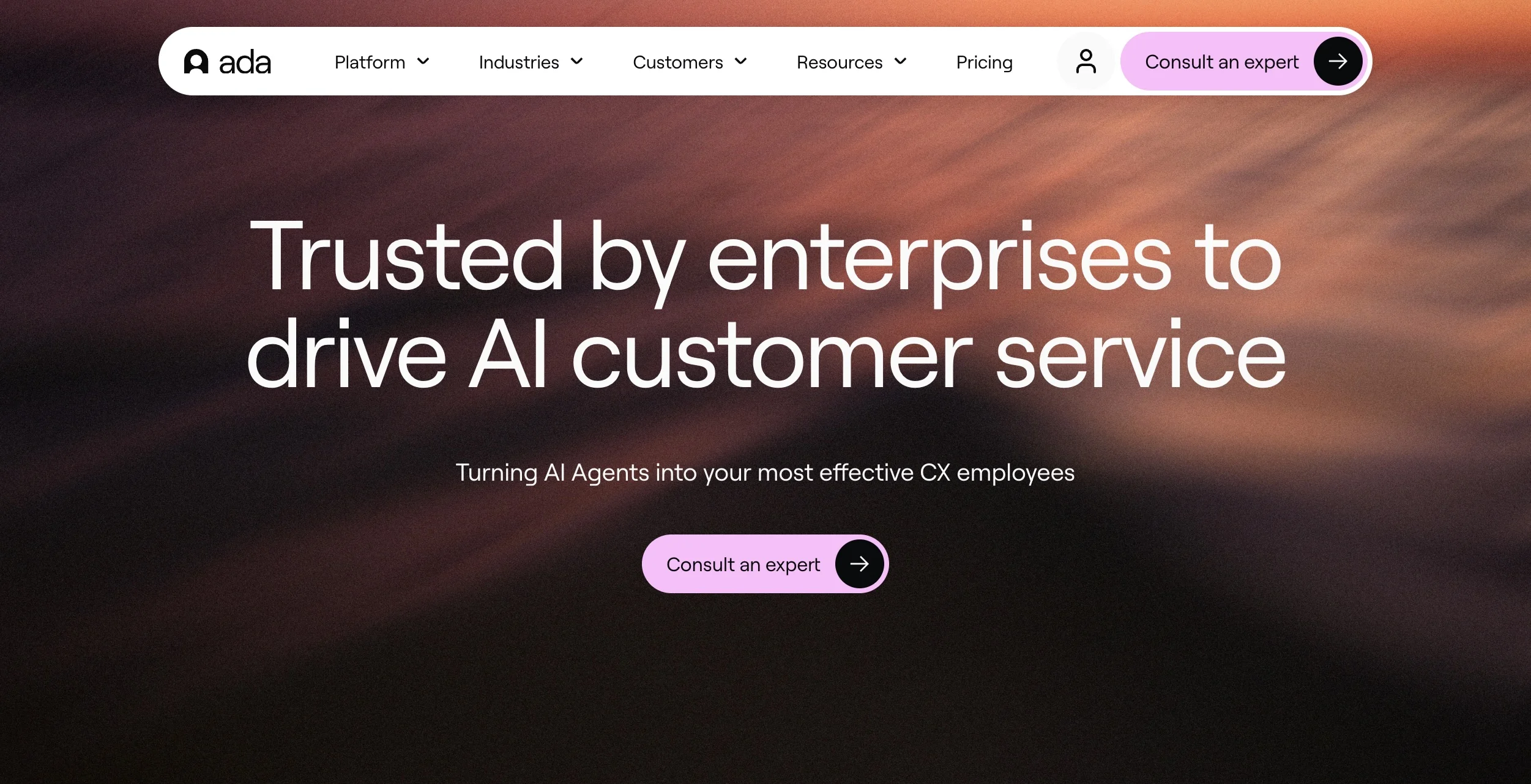
Ada.cx powers AI agents that automate customer service across chat, voice, and email, helping support teams handle complex requests at scale.
Unlike traditional bots that rely on rigid scripts, Ada’s platform was built “AI-first”, meaning its agents can understand intent, trigger workflows, and even escalate to humans when needed, all while maintaining a consistent brand tone.
Advantages compared to Cognigy
- Faster, no-code Playbooks: Ada’s Playbooks let non-technical teams author conversational logic in plain language, reducing reliance on developers and significantly improving time to value by enabling rapid deployment and quick realization of benefits.
- Better transparency & coachability: Ada gives insight into how its agent reasons (decision paths, guardrails, etc.) and supports continuous coaching and feedback loops, making it easier to monitor, refine, and align behavior.
- Tight sync with business systems & real-time integrations: Ada has many prebuilt integrations (Salesforce, Contentful, Twilio, etc.), enabling real-time data sharing and orchestrated actions across systems.
- Strong omnichannel + multilingual support built-in: Ada supports chat, voice, email, messaging, etc., and over 50 languages natively, allowing globally consistent CX across channels.
G2 Rating: 4.6/5 (155 reviews)
Review: “Ada helped our small support team contain the most easy-to-resolve customer inquiries, freeing-up more time for agents to go through our backlog.”
Pricing
Ada uses a performance-based pricing model, where companies pay based on successful resolutions or interaction volume rather than flat usage fees. Exact pricing depends on the number of monthly conversations, integrations, and deployment channels, but most enterprise plans start in the low six figures annually.
Recommended for:
Brands that prioritize customer experience at scale, especially e-commerce, fintech, and telecom companies, where multilingual support and fast automation setup are key.
9. Decagon.ai
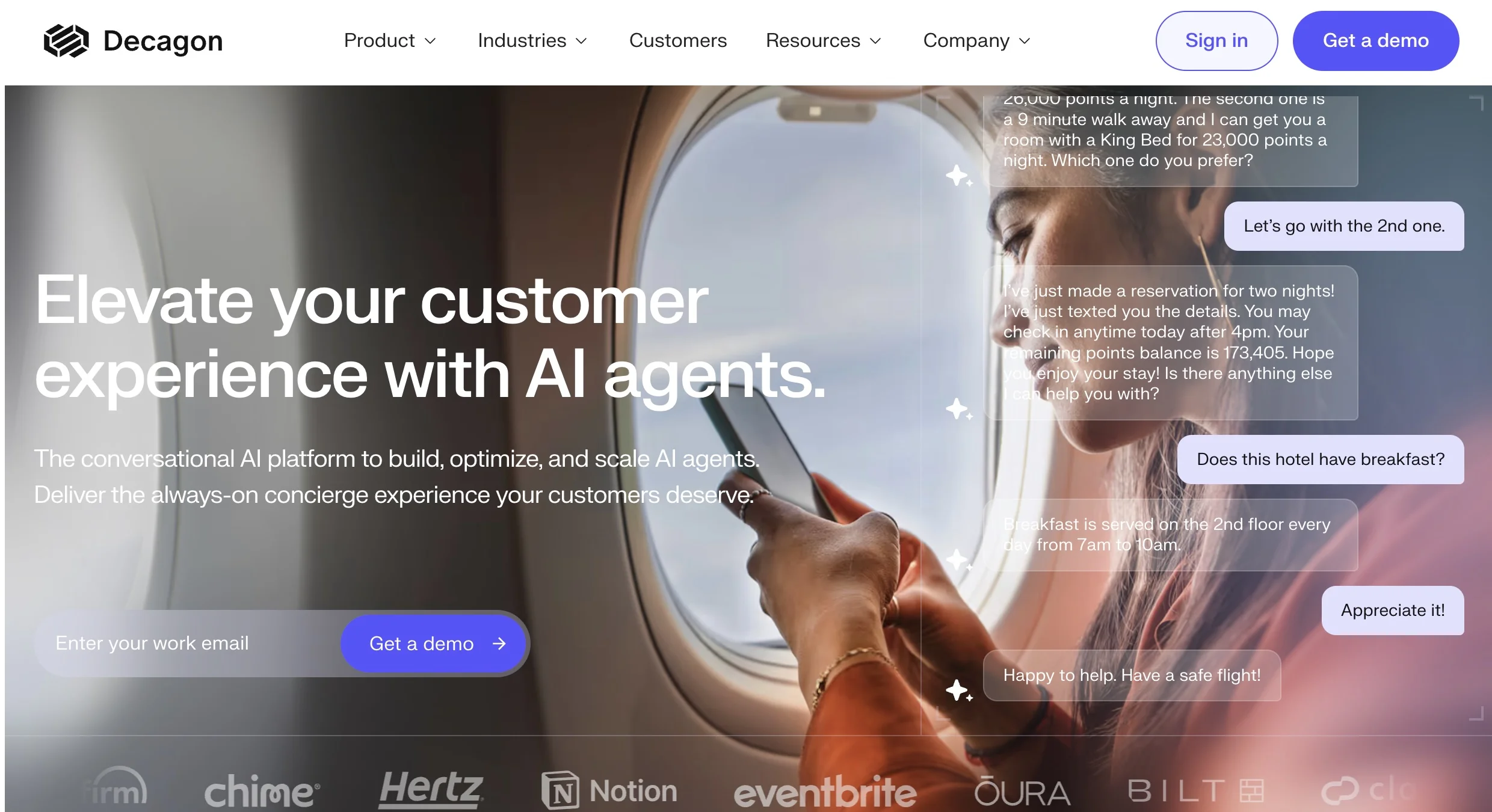
Decagon.ai offers a unified AI engine that auto-resolves customer issues across chat, voice, email, SMS, and custom channels in any language, essentially functioning as an intelligent AI call center that maintains consistent logic and behavior across every communication channel.
Their approach centers on Agent Operating Procedures (AOPs): natural-language instructions that compile into logic, allowing teams to tweak behavior without heavy coding.
Advantages Compared to Cognigy
- Natural-language logic control: Decagon’s Agent Operating Procedures let teams define and adjust conversational behavior using plain language rules, no complex coding required.
- Transparent observability: You can actually see why an agent made a decision. Decagon lets you trace logic paths, detect anomalies, and audit outcomes instead of relying on a black-box model.
- Unified omnichannel logic: Decagon runs on a single logic engine across chat, voice, email, and SMS, so you don’t have to rebuild or maintain separate workflows per channel.
- Enterprise-grade analytics & learning loop: Every conversation is tracked, labeled, and analyzed to surface knowledge gaps or performance issues, helping teams continuously refine their automation.
Pricing
Decagon frames pricing around value. Their two main tiers are:
- Per-conversation pricing: You pay a flat fee per interaction (whether fully resolved or not). This is the more commonly chosen model among their customers.
- Per-resolution pricing: You only pay when the AI fully resolves a query without escalation. No cost for conversations that require human handoff.
Because Decagon is aimed at enterprise clients with large volumes, their base pricing is custom. In one public review, estimated ranges span $95,000 to $590,900+ per year, depending on complexity, volume, and integrations.
G2 Rating: 4.9/5 (18 reviews)
Review: "The biggest upside of using Decagon isn't simply the assumption of repetitive day-to-day tasks that would normally be done manually, but that Decagon allows us to evaluate data on a much deeper level."
Recommended for:
Organizations that demand high customization, transparency, and outcome-driven automation, especially in sectors like fintech, telecom, or SaaS with large support loads.
10. Replicant
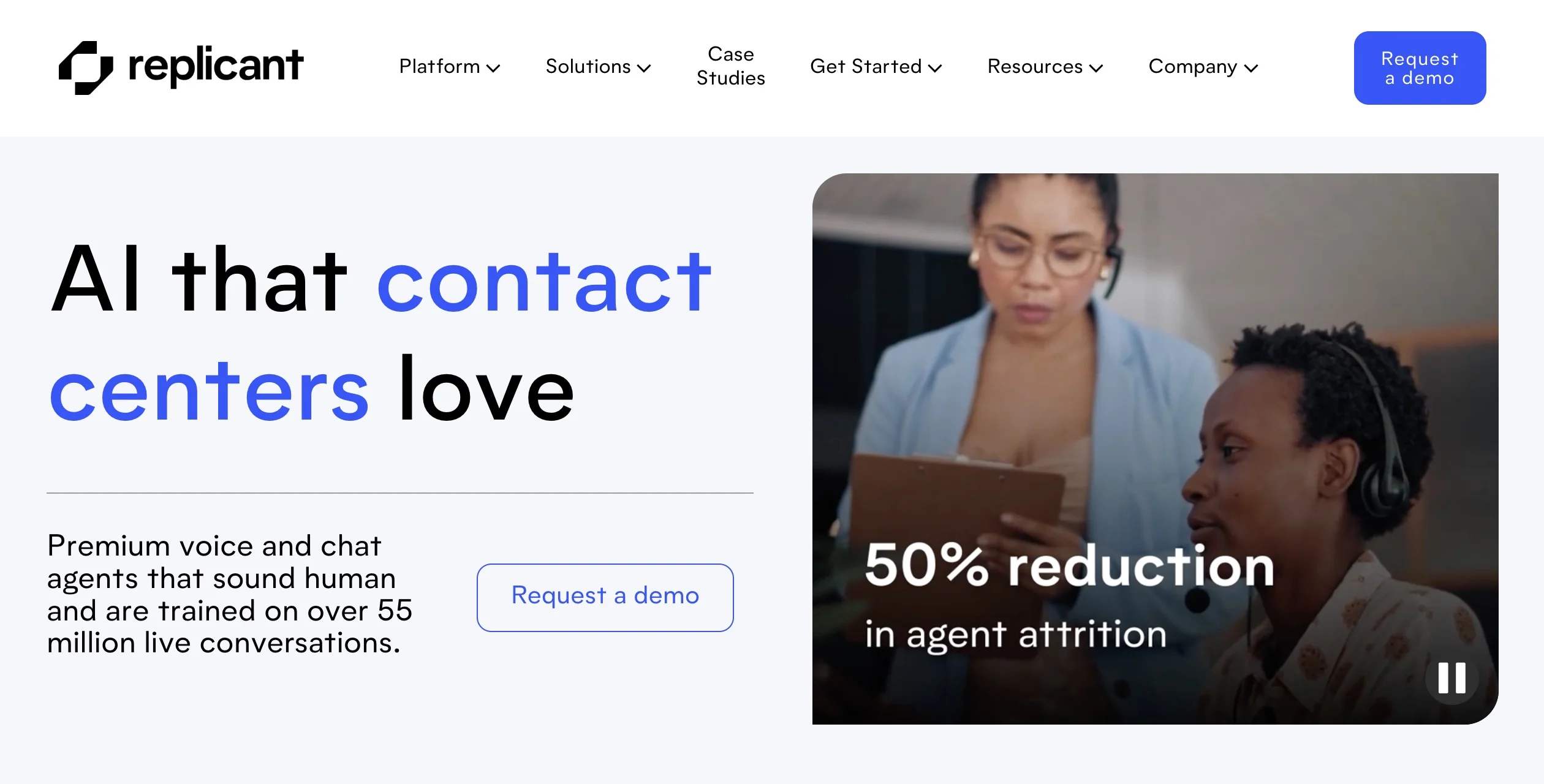
Replicant is an enterprise-grade automation platform for contact centers.
Its “Thinking Machine” resolves Tier-1 customer calls autonomously, escalates to live agents when needed, and integrates with backend systems to complete workflows. The platform includes analytics and conversation intelligence tools for optimizing performance at scale.
Advantages Compared to Cognigy
- True autonomous voice + omnichannel capacity: Replicant is built to fully handle voice calls end-to-end (as an autonomous contact center or an AI telemarketing agent ) while also supporting chat, SMS, email, etc.
- Fast time-to-value & scalable deployment: Replicant claims setups in weeks (often 4-8 weeks) and elastic scaling so you can raise/lower capacity as call volume fluctuates.
- Deep integration & CRM/telephony plugging: It slots into your existing tech stack (IVR, CCaaS, CRM, telephony) rather than requiring a full rip-and-replace.
- Conversation visibility and analytics: You get real-time dashboards, full transcripts, auto-tagging (sentiment, dispositions), and tools to monitor & improve flows, not just black-box responses.
- Strong ROI, cost reductions, and operating efficiency: Replicant touts labor cost savings, reductions in average handle time, elimination of hold times, and improved CSAT.
Pricing
Replicant does not publish pricing publicly. Engagements are structured as enterprise contracts, tailored to call volumes and complexity.
G2 Rating: 4.7/5 (45 reviews)
Review: "The team is quick to reply if there are any technical concerns and is open to feedback. They usually respond within an hour when a ticket is sent in".
Recommended For:
Large-scale contact centers that want to automate high call volumes end-to-end, with the support of an established vendor in the voice automation space.
11. ElevenLabs
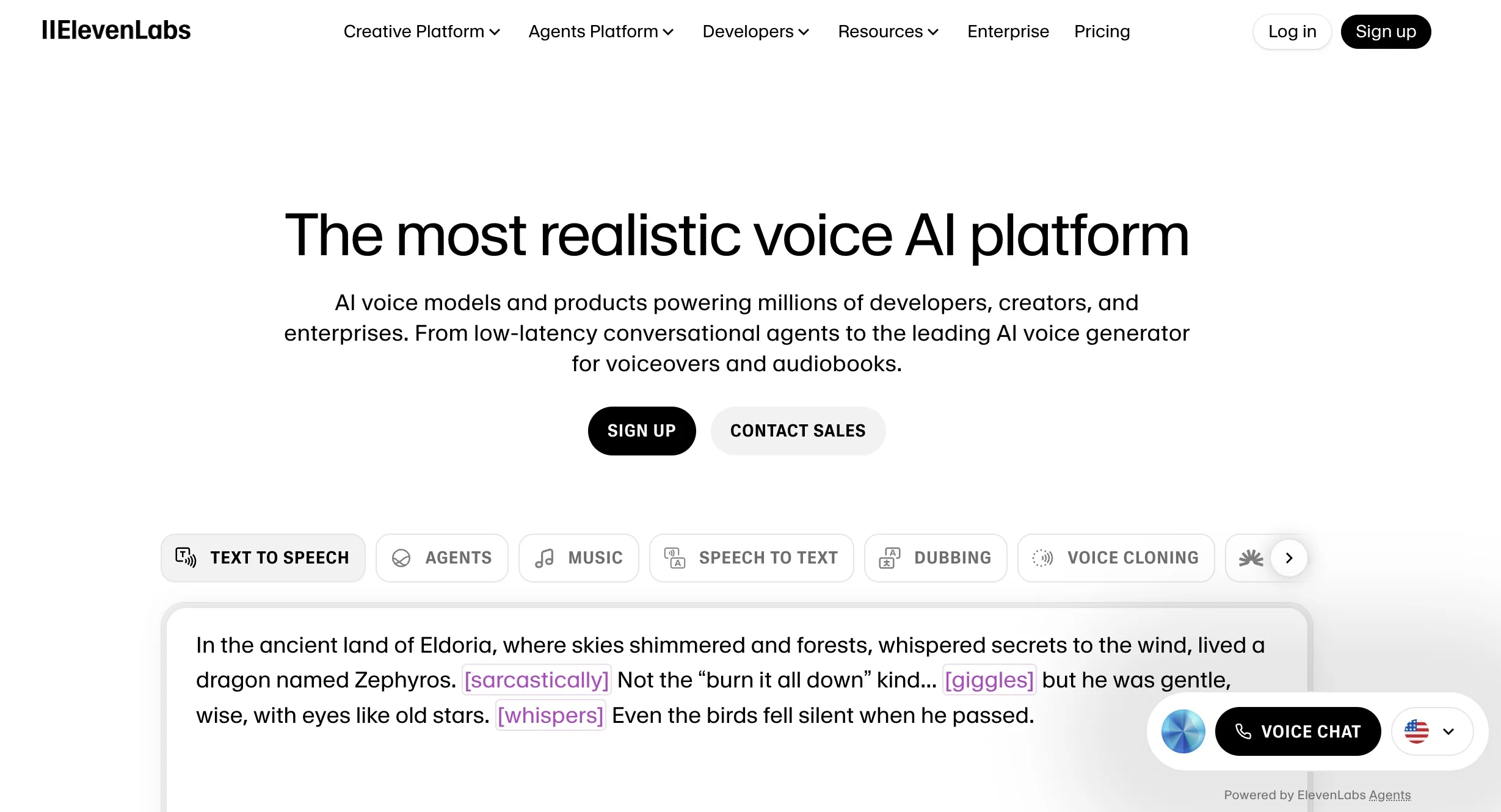
ElevenLabs is best known for its world-class text-to-speech and voice cloning tech, and more recently it’s expanded into conversational AI agents. Their platform can take user input (voice or text), ground it in your data, and produce natural spoken replies.
It’s not yet a full-blown telephony agent system, but it bridges content and voice interaction nicely, especially for brands already working in audio, narration, or voice experiences.
Advantages compared to Cognigy
- Top-tier voice quality & cloning: ElevenLabs is one of the leaders in producing realistic, expressive voice output and voice cloning. Many users praise how “lifelike” its voices sound.
- Conversational AI + voice + text in one: Their Conversational AI product supports both text and voice inputs/outputs, letting you build hybrid agents.
- Flexible “bring-your-own-LLM” and RAG support: You can plug in your own language model or use retrieval-augmented generation, giving more control over output.
Pricing
ElevenLabs uses a credit system. You get a bundle of credits (usable for TTS, agents, etc.), and if you exceed them, you buy more.
Example tiers (as of now):
- Free: 10,000 credits / month (≈10 minutes of high-quality TTS or 15 minutes of agent use)
- Starter: $5/month for 30,000 credits
- Creator / Pro / Business / Enterprise: stepping up to 100k, 500k, millions of credits with higher-quality audio, API priority, SLA, etc.
Because it’s usage-based, your total cost will depend heavily on how many agent minutes you use, how much audio you generate, and how premium the voices are.
Recommended for:
If your product or brand already has a voice or audio focus (podcasts, narration, gaming, or voice apps) and you want to layer in conversational agents, ElevenLabs is a powerful pick. It’s especially strong when you care deeply about sound quality, expressiveness, and voice branding. But if your priority is full telephony integration, call switching, deep voice workflows, or super predictable pricing, Vapi (or others) might still lead in those domains.
Why Retell AI Stands Out as the Best Cognigy Alternative
At Retell, we've seen how crowded the conversational AI landscape has become.
Some tools like Kore.ai or PolyAI shine at the enterprise level, while others like Synthflow or Voiceflow focus on agility and experimentation. But they often force a trade-off between speed, usability, and transparency.
What makes Retell AI different is how it brings these strengths together: sub-second, human-like voice quality; a no-code builder that truly empowers business teams; and transparent, usage-based pricing from day one.
It’s fast to deploy, flexible enough for developers, and compliant for enterprise use, without the long contracts or heavy implementation cycles that slow competitors down.
If you’re looking for a Cognigy alternative that balances power with accessibility, Retell is the one platform I’d recommend, especially if you’re exploring use cases like AI receptionists or phone-based customer service automation.. It gives teams the control and performance they need today while staying nimble enough to evolve with the future of AI voice automation.
See how much your business could save by switching to AI-powered voice agents.
Your submission has been sent to your email
ROI Result
Total Human Agent Cost
AI Agent Cost
Estimated Savings
A Demo Phone Number From Retell Clinic Office
